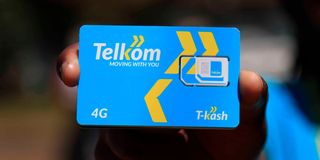Telkom loses 2.1 million mobile customers as rivals gain

A subscriber holds a 4G Telkom SIM card.
What you need to know:
- As at December 2019, Telkom boasted of up to 3.4 million subscribers.
- The number has since dropped to 1.3 million as of December 2023.
The country's third biggest telco by subscriber numbers Telkom Kenya, has lost up to 2.1 million mobile customers over the past five years representing a 61 per cent customer base shrinkage even as rivals Safaricom and Airtel Kenya made gains over the period.
An analysis of data from the Communications Authority of Kenya (CA) shows that as at close of December 2019, Telkom boasted of up to 3.4 million subscribers, a number that has since thinned to stand at 1.3 million as of December 2023.
Over the period, Airtel gained customers at the fastest pace of 37.6 per cent after it onboarded 5.3 million new users to jump from 14.1 million in December 2019 to 19.4 million last December.
Safaricom, meanwhile, grew its customer base by 24.7 per cent, adding 8.7 million users to stand at 44.01 million, up from 35.3 million in the same period.
The struggle by Telkom to keep pace with rivals spells doom for the loss-making State-owned operator as it signals a dip in revenues and compressed margins from calls, text messages and data among other business lines.
Its steepest annual loss of customers occurred during the 12-month period to December last year when it shed 1.8 million subscribers amid a government-led crackdown on irregularly registered SIM cards.
During the period, the telco opened the calendar year in January with 3.1 million active mobile SIM subscriptions but closed December with 1.3 million customers.
In the 2022 calendar year, Telkom lost one million users after it opened January with a 4.1 million base and closed December with 3.1 million.
In March 2022, CA issued a directive that required telco firms to carry out fresh registration of all their mobile telephone subscribers, including those that had already been registered, as part of government measures aimed at arresting SIM fraud and enhancing data security.
At the time, operators were given about seven months to ensure compliance among their subscribers, after which all non-compliant SIM cards would be deactivated.
Telcos were required to re-register their subscribers by updating their details with a digital passport-size photo of the customers in the wake of the CA's directive.
The industry regulator said at the time that irregularly registered SIM cards were used to perpetuate crime, including money laundering, kidnapping, malicious calls, cybercrime and mobile money fraud.
The genesis of the State-led enhancement of rules and fines for use of unregistered SIM cards and those irregularly registered was the September 2013 terrorist attack on the Westgate Mall, where attackers were said to have used unregistered lines to co-ordinate the scheme prompting the CA to conduct a crackdown the same year.





